
Looking for the top Go frameworks for the web? You came to the right place. Go is a multiparadigm, statically typed, and compiled programming language designed by Google. It is similar to C, so if you’re a fan of C, Go will be an easy language to pick up.

Many developers have embraced Go because of its garbage collection, memory safety, and structural typing system. This article will explore the top eight Go web frameworks, evaluating their features, advantages, and potential drawbacks to determine which will best suit your project.
Editor’s note: This article was updated by Jude Miracle in April 2025 to include information on new, emerging Go frameworks (FastHTTP, Gorilla, Chi, Hertz) and remove commentary on more outdated frameworks (Iris, Revel).
The Replay is a weekly newsletter for dev and engineering leaders.
Delivered once a week, it's your curated guide to the most important conversations around frontend dev, emerging AI tools, and the state of modern software.
Here’s a quick summary of the next Go web frameworks we’ll review in this post:
| Framework | Performance (RPS/Memory) | Best Use Cases | Ease of Use & Adoption | GitHub Stars | Recent Commits | Community Engagement |
|---|---|---|---|---|---|---|
| Gin | High (excellent RPS, low memory) | APIs, microservices, lightweight web apps | Easy to learn, large community | 81k+ | Very active | Large, active community; extensive documentation |
| Fiber | Very high (superior RPS, low memory) | APIs, microservices, high-performance web apps | Express.js-like syntax, easy migration, growing community | 35k+ | Active | Mature; quick adoption, good documentation |
| Echo | High (excellent RPS, low memory) | APIs, microservices, performance-critical applications | Minimalist, clean API, good documentation, growing community | 30k+ | Active | Mature; good support, focused on performance |
| Beego | Moderate (full-stack) | Full-stack web apps, APIs, enterprise applications | Feature-rich, ORM, caching, larger codebase, mature community | 31k+ | Moderately active | Mature; established community, comprehensive features |
| FastHTTP | Extremely high (raw performance focus) | High-performance APIs, custom web servers | Low-level, requires more control, less abstraction | 22k+ | Active | Good; performance-focused, less abstraction |
| Gorilla | Moderate (modular, flexible) | APIs, web sockets, complex routing, general web development | Modular, powerful, mature, good documentation, very widely used components. | 21k+ | Moderately active | Mature, large, very commonly used libraries, but not a full framework in the same way as the others listed |
| Chi | High (lightweight router) | APIs, microservices, modular routing | Simple, composable router, easy integration | 19k+ | Active | Good; widely used router, plugin ecosystem |
| Hertz | Extremely high (optimized for microservices) | Microservices, high-throughput APIs, ByteDance infrastructure | Optimized for performance, specialized use case, growing adoption | 6k+ | Very active | Growing; ByteDance backing, performance-focused |
Before reviewing the top Go frameworks more deeply, let’s understand what Go is truly used for. Aside from building general web applications, the language’s scope encompasses a wide range of use cases:
Go web frameworks were created to ease Go web development processes without worrying about setups and focusing more on the functionalities of a project.
Using Go without a framework is possible. However, it is much more tedious, and developers must constantly rewrite code. This is where the web frameworks come in.
With frameworks, for example, instead of writing a wrapper around a database connection in every new project, developers can pick a favorite framework and focus more on the business logic.
Now, let’s review a few of the features that make Go popular.
Static typing provides better performance at runtime because it’s mostly used to build high-performance applications that are highly optimized at compile times.
Static typing also finds hidden problems like type errors. For example, if I were creating an integer variable, the compiler would recognize its type as an integer and only accept integer values. This makes it easier to manage code for larger projects.
Many developers have created production-ready packages on top of the standard Go packages. These packages often become the standard libraries for specific features. For example, Gorilla Mux was created for routing by the community because the initial Go router is quite limited.
All Go-related packages are available on GitHub, including MongoDB, Redis, and MySQL.
The development time for these Go frameworks is fast and simple. Packages are already available and can be imported easily, eliminating the need to write redundant code.
Go’s goroutines provide language-level support for concurrency, lightweight threads, strict rules for avoiding mutation to disallow race conditions, and overall simplicity.
Compared to languages like Java, JavaScript, etc., Go has a relatively young ecosystem, so you may have fewer libraries to work with. Or, you may need to implement some functionalities from scratch, depending on what you’re building.
Go’s minimalistic design philosophy may seem limiting if you’re used to other languages. The missing features may be complementary to your project, and Go’s standard library is limited, so you might have to rely on third-party packages for functionalities that are readily available in other languages.
In the following sections, we’ll explore the top eight Go frameworks to see what they each offer.
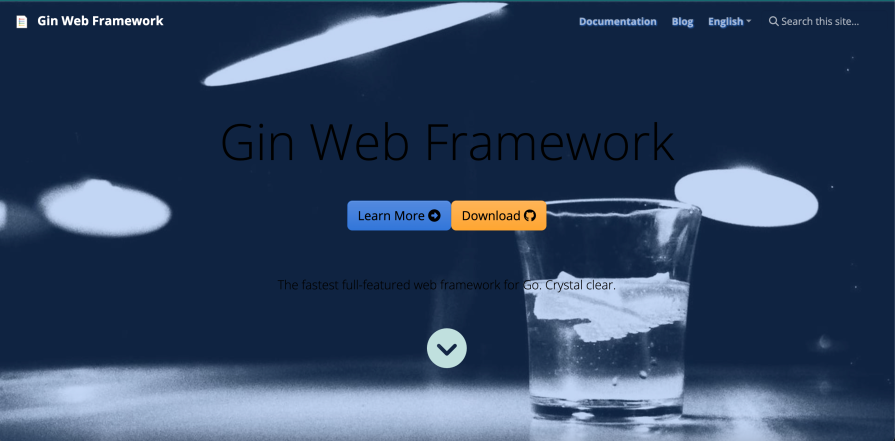
Gin is an HTTP web framework written in Go that is very popular, with over 81k stars on GitHub at the time of writing. Currently, Gin is the most popular framework for building microservices because it offers a simple way to build a request-handling pipeline where you can plug in middleware.
Gin also boasts a Martini-like API and, according to Gin’s GitHub page, is 40x faster because of httprouter. Below are some of its amazing features.
Gin offers convenient error management. This means that when encountering any errors during an HTTP request, Gin documents the errors as they occur:
c.AbortWithStatusJSON(400, gin.H{
"error": "Blah blahhh"
})
// continue
c.JSON(200, gin.H{
"msg": "ok"
})
Gin also makes it incredibly easy to create middleware, which can be plugged into the request pipeline by creating a router with r := gin.New() and adding a logger middleware with r.Use(gin.Logger()).
You can also use a recovery middleware with r.Use(gin.Recovery()).
Gin’s performance is thanks to its route grouping and small memory. Gin’s grouping ability for routes lets them nest infinitely without affecting performance.
Its fast performance is also thanks to its small memory, which Gin uses or references while running. The more memory usage the server consumes, the slower it gets. And because Gin has a low memory footprint, it provides faster performance.
Finally, Gin provides support for JSON validation. Using JSON to send requests can validate required values, like input data from the client. These values must be validated before saving in memory, so by validating them, developers can avoid saving inaccurate values.
Gin is a simple, easy-to-use framework. This makes it the ideal framework for those just starting with Go, because it is minimal and straightforward to use.
Check out this quickstart Gin tutorial for more information.
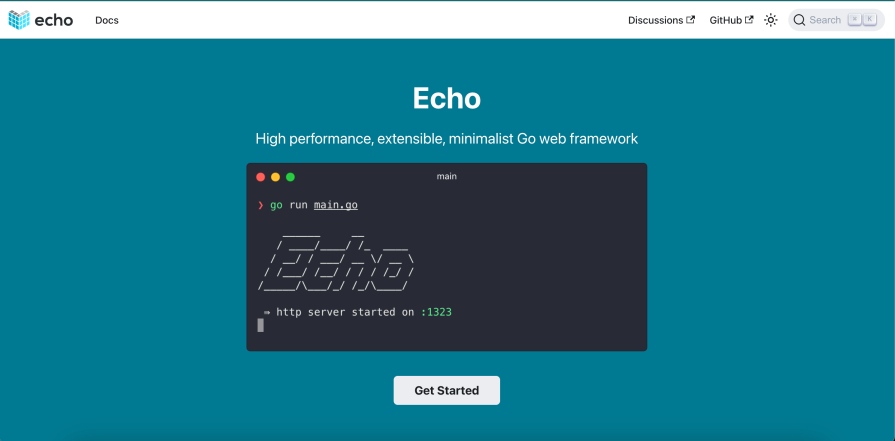
Echo is another promising framework created by Labstack with nearly 30k stars on GitHub. Echo is also regarded as a micro framework, which is more of a standard library and a router, and has fully baked documentation for developers to follow.
This framework is great for people who want to learn how to create APIs from scratch, thanks to its extensive documentation.
Echo lets developers define their own middleware and also has built-in middleware to use. This gives developers the ability to create custom middleware to get specific functionalities while having the built-in middleware speed up production.
Echo also supports HTTP/2 for faster performance and an overall better user experience. Its API also supports a variety of HTTP responses like JSON, XML, stream, blob, file, attachment, inline, and customized central HTTP error handling.
Finally, Echo supports a variety of templating engines, providing the flexibility and convenience developers need when choosing an engine.
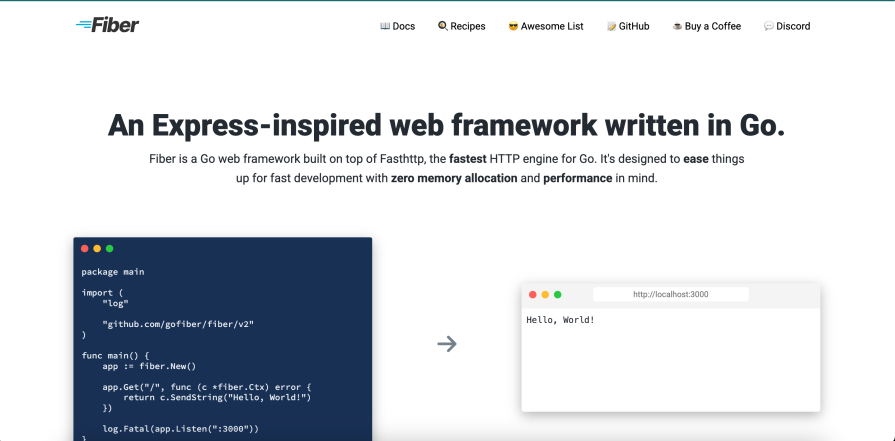
Fiber is another Express.js-like web framework written in Go that boasts low memory usage and rich routing. Built on top of the fasthttp HTTP engine for Go, which is the fastest HTTP engine for Go, Fiber is one of the fastest Go frameworks.
Created with the main focus of minimalism and the Unix philosophy to provide simple and modular software technology, the idea for Fiber was to allow new Go developers to begin creating web applications quickly.
Fiber boasts a built-in rate limiter that helps reduce traffic to a particular endpoint. This is helpful if, for example, a user tries to sign in to an account continuously and knows that it might be malicious activity.
Its static files — style sheets, scripts, and images — can be handled and served from the server. This means they can be easily cached while consuming less memory. The content remains static upon every request.
Fiber’s support for WebSocket bidirectional TCP connections is useful for creating real-time communications, like a chat system.
Like the other Go frameworks we’ve mentioned in this post, Fiber has versatile middleware support, supports a variety of template engines, has low memory usage and footprint, and provides great documentation that is easy for new users to follow.

Beego is another Go web framework that is mostly used to build enterprise web applications with rapid development.
Beego has four main parts that make it a viable Go framework:
log, config, and governorBelow are some of the features that Beego offers.
Because Beego focuses on enterprise applications, which tend to be very large with a lot of code powering many features, a modular structure arranges modules for specific use cases, optimizing performance.
The modular structure of the Beego framework supports features like a configuration module, logging module, and caching module.
Beego also uses a regular MVC architecture to handle specific development aspects in an app, which is also beneficial for enterprise applications.
Beego also supports namespace routing, which defines where the Controller is located for a Route. Here is an example:
func init() {
ns :=
beego.NewNamespace("/v1",
beego.NSRouter("/auth", &controllers.AuthController{}),
beego.NSRouter("/scheduler/task",&controllers.TaskController{}),
)
beego.AddNamespace(ns)
}
Beego’s automated API documentation through Swagger provides developers with the automation they need to create API documentation without wasting time manually creating it.
Route annotation lets developers define any component for a route target for a given URL. This means routes do not need to be registered in the route file again; only the controller should use Include.
With the following route annotation, Beego parses and turns them into routes automatically:
// Weather API
type WeatherController struct {
web.Controller
}
func (c *WeatherController) URLMapping() {
c.Mapping("StaticBlock", c.StaticBlock)
c.Mapping("AllBlock", c.AllBlock)
}
// @router /staticblock/:key [get]
func (this *WeatherController) StaticBlock() {
}
// @router /all/:key [get]
func (this *WeatherController) AllBlock() {
}
Then, register the Controller:
web.Include(&WeatherController{})
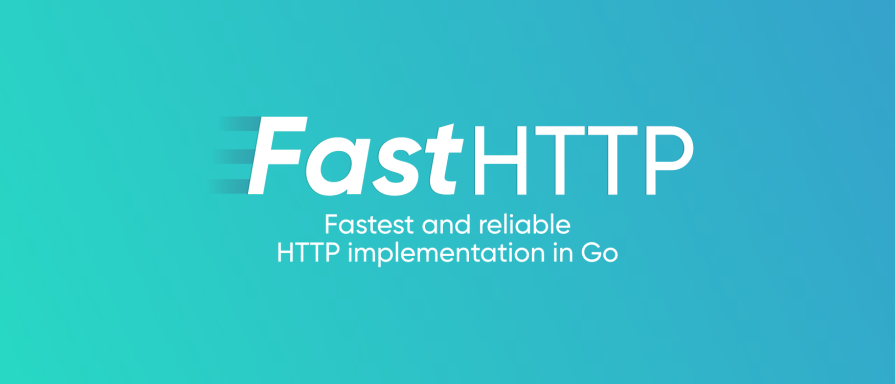
FastHTTP, as the name suggests, is a very fast HTTP framework for Go. It focuses on high performance and efficiency. Unlike many other Go web frameworks, FastHTTP does not use the standard net/http package. Instead, it builds its own HTTP server and client from the ground up, which is optimized for speed and low memory use. As of now, FastHTTP is quite popular, with over 22k stars on GitHub.
FastHTTP works well for situations that need high speed and low delay, such as real-time APIs, microservices, and web applications with high user traffic. It can handle over 100,000 requests per second, manage over 1 million active connections at once, and work with different types of data like JSON, XML, and form-data. Here are some of its key features.
FastHTTP is designed for speed. It avoids using the standard net/http package and improves every part of handling HTTP requests. As a result, FastHTTP offers much higher speed and lower delays compared to many other frameworks. Tests show that FastHTTP consistently outperforms other Go web frameworks, particularly when there are many requests at the same time.
Here’s an example of setting up a basic FastHTTP server:
package main
import (
"github.com/valyala/fasthttp"
)
func main() {
requestHandler := func(ctx *fasthttp.RequestCtx) {
ctx.WriteString("Hello, FastHTTP!")
}
fasthttp.ListenAndServe(":8080", requestHandler)
}
In addition to its server capabilities, FastHTTP has a fast and efficient HTTP client that works well for making requests. This client is designed for speed, making it a great option for applications where performance is important.
Here’s an example of using the FastHTTP client:
func main() {
client := &fasthttp.Client{}
req := fasthttp.AcquireRequest()
resp := fasthttp.AcquireResponse()
defer fasthttp.ReleaseRequest(req)
defer fasthttp.ReleaseResponse(resp)
req.SetRequestURI("http://example.com")
if err := client.Do(req, resp); err != nil {
panic(err)
}
println("Response status:", resp.StatusCode())
println("Response body:", string(resp.Body()))
}
FastHTTP uses a special object called RequestCtx to manage HTTP requests and responses. This object is reused for different requests, which helps reduce memory use and the need for garbage collection. This design leads to FastHTTP’s great performance.
Here’s an example of how to handle different HTTP methods and read request data:
requestHandler := func(ctx *fasthttp.RequestCtx) {
switch string(ctx.Path()) {
case "/hello":
ctx.WriteString("Hello, FastHTTP!")
case "/user":
if ctx.IsPost() {
name := ctx.FormValue("name")
ctx.WriteString("Hello, " + string(name))
} else {
ctx.Error("Method not allowed", fasthttp.StatusMethodNotAllowed)
}
default:
ctx.Error("Not found", fasthttp.StatusNotFound)
}
}
To get started with this high-performance framework, explore its documentation and visit its GitHub repo.
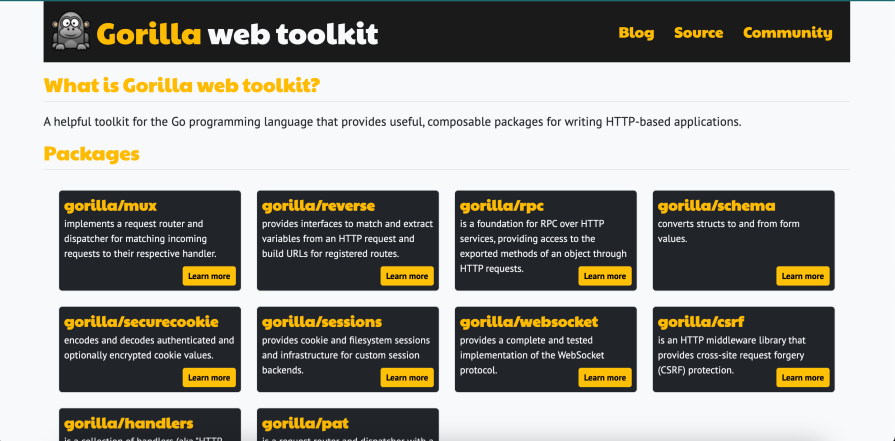 Gorilla is not exactly a web framework; it’s a set of modular packages that help developers build web applications in Go. It is known for being flexible and simple, making it popular among developers who like to create their own toolkit instead of using a strict framework. As of now, the Gorilla toolkit has gained a lot of popularity, with its individual packages receiving thousands of stars on GitHub.
Gorilla is not exactly a web framework; it’s a set of modular packages that help developers build web applications in Go. It is known for being flexible and simple, making it popular among developers who like to create their own toolkit instead of using a strict framework. As of now, the Gorilla toolkit has gained a lot of popularity, with its individual packages receiving thousands of stars on GitHub.
Gorilla’s modular approach lets developers choose the components they need, making it adaptable for various use cases. Below are some of its standout packages and features.
Gorilla Mux is a popular package in the Gorilla toolkit. It offers a strong and flexible router for building HTTP services. Unlike the default Go router, Gorilla Mux supports advanced routing features like route parameters, query parameters, and HTTP method-based routing.
Here’s a simple example of how to set up a basic Gorilla Mux router:
package main
import (
"net/http"
"github.com/gorilla/mux"
)
func main() {
r := mux.NewRouter()
r.HandleFunc("/", func(w http.ResponseWriter, r *http.Request) {
w.Write([]byte("Hello, Gorilla Mux!"))
})
http.ListenAndServe(":8080", r)
}
Gorilla Sessions helps you manage user sessions easily in your web application. It works with different types of session storage, like cookies and server-side options such as Redis or MySQL. This package is great for setting up user authentication and storing user data. Here’s an example of how to use Gorilla Sessions:
package main
import (
"net/http"
"github.com/gorilla/sessions"
)
var store = sessions.NewCookieStore([]byte("super-secret-key"))
func main() {
http.HandleFunc("/", func(w http.ResponseWriter, r *http.Request) {
session, _ := store.Get(r, "session-name")
session.Values["foo"] = "bar"
session.Save(r, w)
w.Write([]byte("Session saved!"))
})
http.ListenAndServe(":8080", nil)
}
Gorilla Websocket is a popular tool for using WebSocket communication in Go. It offers a simple and user-friendly way to build real-time applications, such as chat servers, live notifications, and collaborative tools. Here’s how to set up a WebSocket server using Gorilla Websocket:
package main
import (
"net/http"
"github.com/gorilla/websocket"
)
var upgrader = websocket.Upgrader{
CheckOrigin: func(r *http.Request) bool {
return true
},
}
func main() {
http.HandleFunc("/ws", func(w http.ResponseWriter, r *http.Request) {
conn, _ := upgrader.Upgrade(w, r, nil)
defer conn.Close()
for {
messageType, p, err := conn.ReadMessage()
if err != nil {
return
}
conn.WriteMessage(messageType, p)
}
})
http.ListenAndServe(":8080", nil)
}
Gorilla uses Gorilla Schema to make it easy to convert form data into Go structs. It is useful for managing HTML form submissions and checking user input for correctness. Here’s an example of how to use Gorilla Schema:
package main
import (
"net/http"
"github.com/gorilla/schema"
)
type User struct {
Name string `schema:"name"`
Email string `schema:"email"`
}
func main() {
http.HandleFunc("/", func(w http.ResponseWriter, r *http.Request) {
if r.Method == "POST" {
r.ParseForm()
var user User
decoder := schema.NewDecoder()
decoder.Decode(&user, r.PostForm)
w.Write([]byte("User: " + user.Name + ", Email: " + user.Email))
} else {
w.Write([]byte("Submit a form!"))
}
})
http.ListenAndServe(":8080", nil)
}
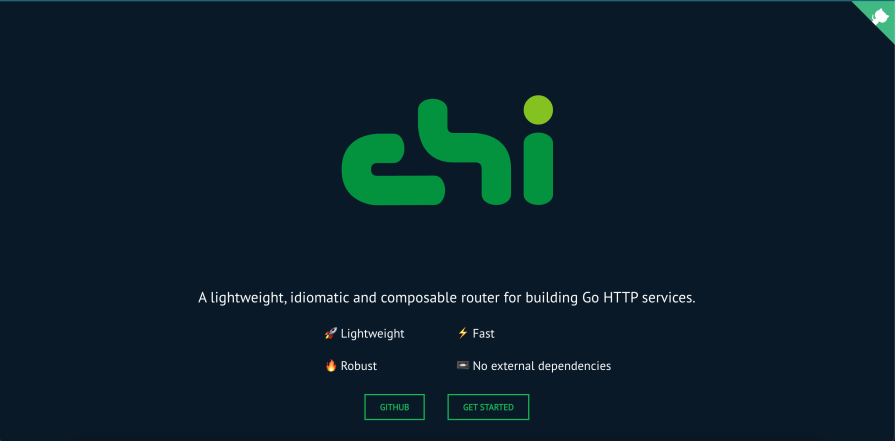 Chi is a lightweight and easy-to-use router for building HTTP services in Go. Its simplicity and flexibility make it a popular choice for Go developers creating RESTful APIs and web applications. As of now, Chi has over 19k stars on GitHub, showing its wide use and strong community support.
Chi is a lightweight and easy-to-use router for building HTTP services in Go. Its simplicity and flexibility make it a popular choice for Go developers creating RESTful APIs and web applications. As of now, Chi has over 19k stars on GitHub, showing its wide use and strong community support.
Chi has a modular design that helps developers create robust and scalable applications without unnecessary complexity. It offers a clear and straightforward API for routing and middleware, making it suitable for both beginners and experienced developers. Here are some of its key features.
Chi is a lightweight and fast framework that has minimal overhead. It does not include built-in features like templating or database management, which helps keep it small and focused. Instead, Chi encourages developers to use external libraries for extra features. This way, your application only includes what it needs.
Here’s an example of defining routes with parameters and nested routes:
r := chi.NewRouter()
r.Route("/users", func(r chi.Router) {
r.Get("/", listUsers) // GET /users
r.Post("/", createUser) // POST /users
r.Route("/{userID}", func(r chi.Router) {
r.Get("/", getUser) // GET /users/{userID}
r.Put("/", updateUser) // PUT /users/{userID}
r.Delete("/", deleteUser) // DELETE /users/{userID}
})
})
Chi has a strong middleware system that helps developers easily add features like logging, authentication, and error handling. In Chi, middleware can be combined, allowing you to use it globally, on specific routes, or for groups of routes. Chi also provides built-in middleware for common tasks.
Here’s an example of using middleware in Chi:
r := chi.NewRouter()
// Global middleware
r.Use(middleware.Logger)
r.Use(middleware.Recoverer)
// Route-specific middleware
r.With(middleware.BasicAuth("admin", "password")).Get("/admin", adminHandler)
Chi also uses Go’s context package to share information and manage data related to requests. This makes it easy to pass details like user authentication or request IDs between middleware and handlers. Chi also makes it simple to chain middleware together, allowing developers to create more complex ways to handle requests.
net/http and contextChi is a framework that builds on Go’s standard net/http package and uses the context package effectively. This makes it easy to use with other Go libraries and tools. Unlike some frameworks that create their own systems, Chi works directly with http.Handler and http.HandlerFunc. This simplicity makes it easy to integrate with other Go code.
Chi also uses context.Context for values related to requests, as well as for timeouts and cancellations. This fits well with Go’s approach to handling multiple tasks at the same time.
For more information, check out the Chi GitHub repository and explore its documentation to get started with this powerful framework today!
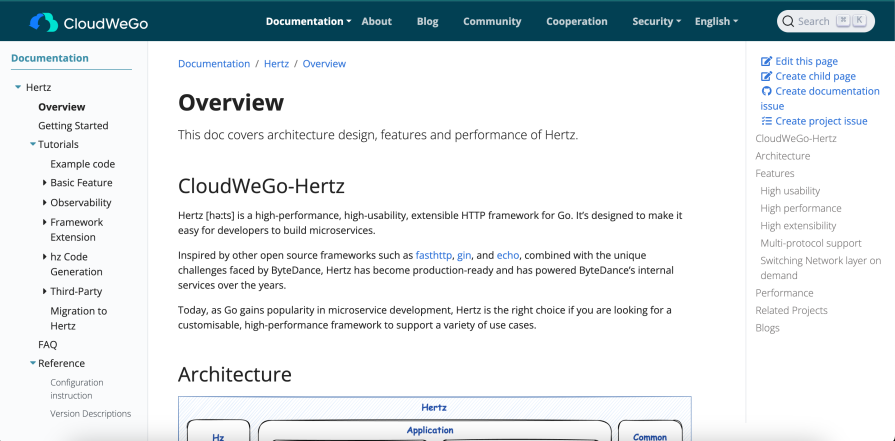 Hertz is a high-performance, extensible HTTP web framework designed for building efficient and scalable web applications in Go. Developed by CloudWeGo, Hertz is optimized for modern cloud-native environments and has quickly gained traction in the Go community for its speed, flexibility, and developer-friendly features. At the time of writing, Hertz has over 6k stars on GitHub and active contributors.
Hertz is a high-performance, extensible HTTP web framework designed for building efficient and scalable web applications in Go. Developed by CloudWeGo, Hertz is optimized for modern cloud-native environments and has quickly gained traction in the Go community for its speed, flexibility, and developer-friendly features. At the time of writing, Hertz has over 6k stars on GitHub and active contributors.
Hertz is built to handle high-concurrency scenarios, making it an excellent choice for microservices, APIs, and real-time applications. It combines the simplicity of Go with advanced features like high-performance routing, middleware support, and seamless integration with other CloudWeGo ecosystem tools. Below are some of its standout features.
Hertz is built on top of Netpoll, a high-performance I/O library that significantly reduces latency and improves throughput. Its routing engine can manage thousands of requests each second with little extra cost, making it perfect for applications that need to handle many users at once. Hertz allows for organized coding with its support for parameterized routing and route grouping.
Here’s an example of defining routes in Hertz:
h := server.Default()
h.GET("/hello", func(c context.Context, ctx *app.RequestContext) {
ctx.String(200, "Hello, Hertz!")
})
h.POST("/users", func(c context.Context, ctx *app.RequestContext) {
// Handle user creation
})
h.GET("/users/:id", func(c context.Context, ctx *app.RequestContext) {
userId := ctx.Param("id")
// Fetch user by ID
})
Hertz offers a strong middleware system that helps developers extend the framework’s features. You can use middleware for tasks like logging, authentication, rate limiting, and error handling. Hertz also provides built-in middleware for common tasks, including recovery and CORS.
Here’s an example of adding middleware to a Hertz application:
h := server.Default()
// Custom middleware
h.Use(func(c context.Context, ctx *app.RequestContext) {
fmt.Println("Request received")
ctx.Next(c)
})
// Built-in recovery middleware
h.Use(recovery.Recovery())
The Hertz framework supports HTTP 1.1 and the ALPN protocol right out of the box. Its layered design also allows for custom protocol implementations, so it can adapt to different needs.
Hertz is easy to extend, allowing developers to add third-party libraries and tools without trouble. It is part of the CloudWeGo ecosystem, which also includes other high-performance tools like Kitex, a Go RPC framework, and Volo, a Rust RPC framework. This makes Hertz a great option for building complete cloud-native applications.
For more information, check out the official Hertz GitHub repository and explore its documentation to get started with this powerful framework today!
The performance of a web framework is important for the scalability and responsiveness of web applications.
The smallnest/go-web-framework-benchmark repository offers helpful insights into how different popular Go web frameworks compare in terms of performance. By looking at the benchmark results, we can better understand the strengths and weaknesses of each framework based on different levels of concurrent users and processing tasks. The benchmarks show how well each framework works in various situations.
We ran the tests in four main scenarios:
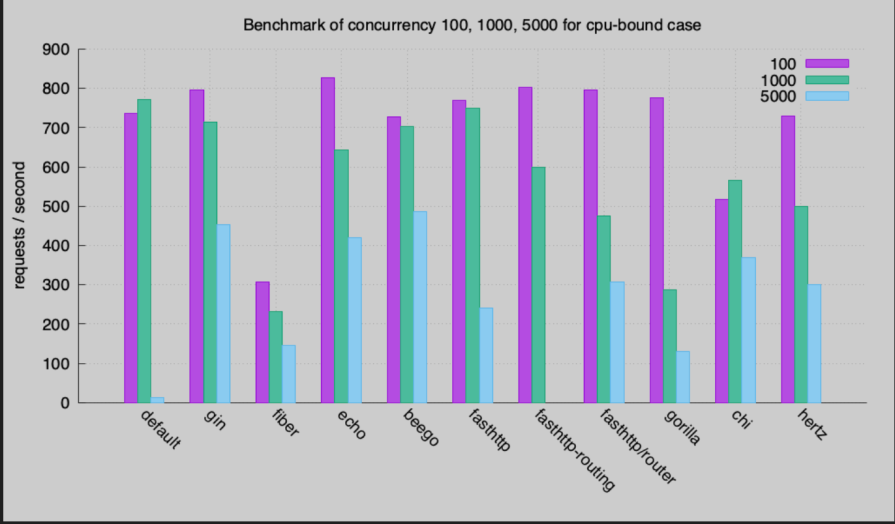 This graph shows how different frameworks perform with various numbers of concurrent requests for a CPU-bound task. Here are the main points:
This graph shows how different frameworks perform with various numbers of concurrent requests for a CPU-bound task. Here are the main points:
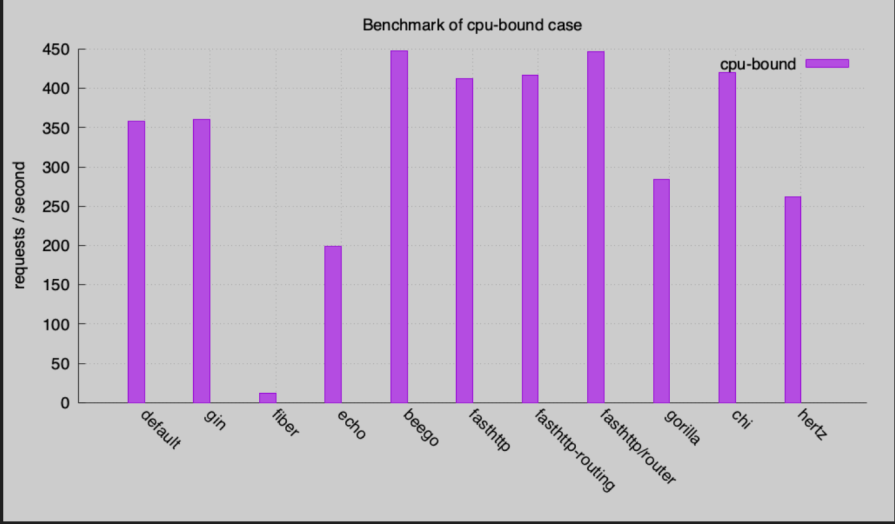 This graph looks specifically at CPU-bound tasks:
This graph looks specifically at CPU-bound tasks:
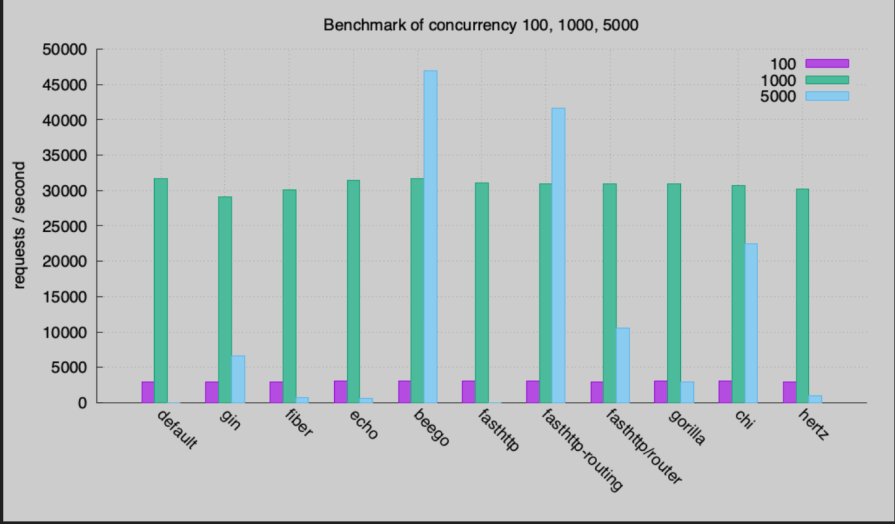 This graph presents performance with different levels of concurrent requests:
This graph presents performance with different levels of concurrent requests:
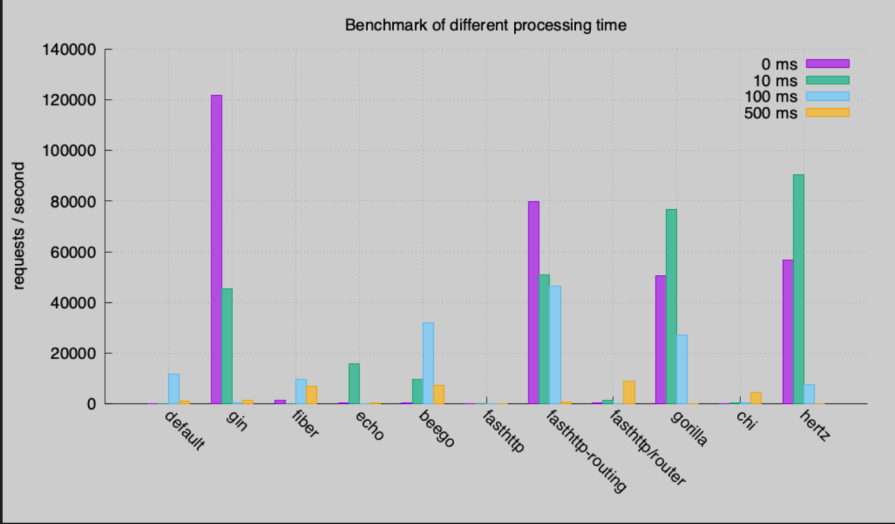
This graph examines how performance changes with different processing times:
FastHTTP is usually the best performer. Gin and Echo provide a great balance of performance and user-friendliness.
Performance varies greatly depending on concurrency, processing, and some other metrics. For high-concurrency and performance-critical applications, consider FastHTTP. For a good balance of performance and ease of use, choose Gin or Echo.
For complex, enterprise-level applications, look at Beego. For lightweight, simple services, Chi may be best.
The Go web framework community is active on Reddit and GitHub. The most popular frameworks on GitHub are Gin and Echo. Gin has the most stars and forks, making it a top choice for fast APIs. Fiber is also becoming popular due to its Express.js-like syntax and good performance, although there are some worries about how well it works with Go’s standard library.
Chi and Gorilla are known for their simplicity. Chi focuses on middleware, while Gorilla provides a modular toolkit. Hertz, which is supported by ByteDance, is growing in use, especially for larger applications. FastHTTP is very fast but has compatibility issues.
On Reddit, there is a discussion on whether to use frameworks or minimal routers. Gin is recommended for beginners, while Fiber is popular with those moving from Node.js. Chi is also becoming a popular recommendation because of its simplicity.
When choosing a framework, consider your project’s needs, such as performance, ease of use, features, and developer skills. The Go web framework ecosystem provides effective tools for building everything from microservices to complex systems.
Gin is a lightweight and fast web framework for building APIs quickly. Its simple routing makes it easy to create web services. Fiber, inspired by Express.js, offers speed and familiarity, making it great for WebSocket applications. It also takes advantage of Go’s efficiency with memory and concurrency. Echo is for developers who need type safety and support for middleware. It suits enterprise applications and API gateways, although it has a steeper learning curve. Beego provides a complete MVC architecture with built-in tools. It is suitable for large-scale applications that require complex software and session management.
FastHTTP is a library focused on low-latency programming, perfect for high-performance needs like trading platforms. Gorilla gives developers control over modular web infrastructure with flexible routing and WebSocket support, but it requires more setup. Chi is a minimalist framework that uses Go’s standard library, making it efficient for microservices and REST APIs. Hertz has a cloud-native design and supports multiple protocols. It is a good choice for modern architecture.
In this article, we explored eight popular Go web frameworks that offer a variety of features and philosophies. This list isn’t definitive. Your ideal framework might not even be on the list, but that shouldn’t stop you from choosing the right framework for your project.
Many of these frameworks share similar features and are inspired by others, but each has unique aspects that are suitable for different development challenges. I hope this helps you pick the right framework for your next Go project.
Install LogRocket via npm or script tag. LogRocket.init() must be called client-side, not
server-side
$ npm i --save logrocket
// Code:
import LogRocket from 'logrocket';
LogRocket.init('app/id');
// Add to your HTML:
<script src="https://cdn.lr-ingest.com/LogRocket.min.js"></script>
<script>window.LogRocket && window.LogRocket.init('app/id');</script>

Compare the top AI development tools and models of February 2026. View updated rankings, feature breakdowns, and find the best fit for you.

Broken npm packages often fail due to small packaging mistakes. This guide shows how to use Publint to validate exports, entry points, and module formats before publishing.

Discover what’s new in The Replay, LogRocket’s newsletter for dev and engineering leaders, in the February 11th issue.
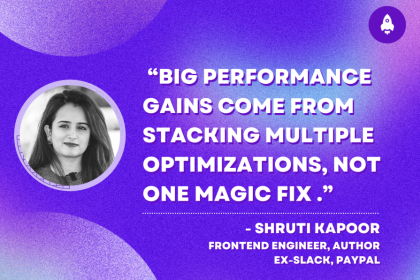
Cut React LCP from 28s to ~1s with a four-phase framework covering bundle analysis, React optimizations, SSR, and asset/image tuning.
Hey there, want to help make our blog better?
Join LogRocket’s Content Advisory Board. You’ll help inform the type of content we create and get access to exclusive meetups, social accreditation, and swag.
Sign up now
6 Replies to "The 8 best Go web frameworks for 2025: Updated list"
So, I’ve just reading some bunch of articles about Go web frameworks, just to make sure I’m keeping up with today’s Go news. I, personally, like to glue things myself with bunch of libraries and won’t use any web frameworks in near future, this is just for reference in case somebody I know want to jump in to wagon and Go! (pun intended).
This article is good for starting point, but there’s something wrong on this article in my opinion. Please correct me if I’m wrong here, feel free to do so. I’m just pointing some sections that I think it’s not right, either it’s useful or not, so other beginner knows the stuffs and don’t fall further.
First, you mention that Gin has low memory footprint, and it means that Gin has fast performance. This is incorrect ways of thinking. Sure, Gin is fast, but low memory doesn’t equal fast performance. If you’re using bunch of caching correctly, it might have high memory footprint, but it does faster (mind the correctness usage of caching). So my point here is, low memory doesn’t mean fast performance.
On Gin’s JSON validation section, instead of using “These values must be validated before saving in memory”, you can use “These values must be validated before used on business logic”. The unvalidated raw JSON request is already in memory.
You mention on Beego section that modular structure optimizes performance, that is incorrect. Project structure doesn’t determine performance, and sometimes if you build modular structure incorrectly, you’ll get slower performance. But if performance that you mean is development performance, then I believe modular structure helps on that too.
I never wanted to label myself as ‘expert’ on anything, in fact I’m not, so take this comment with grain of salt. I think I’m missing other points but my limited knowledge hinders me from those points. Feel free to correct me if I’m wrong, as I’m here to learn too.
Oh, and lastly, please AVOID Iris as much as possible, treat it and the owner like a plague. Stealing other codes without credit, deleting issues and comments, self claiming that it’s the best of the best, and many more. Not a healthy open source project, thus it’s better to stay away from that. There are bunch of other good frameworks beside Iris, this article mention 4 of them, so there’s no point on investing on Iris. You won’t see Iris mentioned on other popular projects too, because they’re already know. If you don’t believe me, try search Iris history on search engines with “iris golang drama” as the keyword, and you will know how worse that project is.
Thanks for reading, and have a good day!
Hi there, I have a few disagreements to your points.
First, you disagreed on low memory footprint yielding to a fast performance which is true, definitely. As you know, an OS relies a lot on the RAM for a smooth running of tasks. So, for Gin to have low memory usage says a lot to how fast it can be. According to the article, “low memory footprint” not low memory.
Secondly, validated data isn’t saved in memory unless being made so by the business logic. The “memory” here is the database. Data coming in is validated and then saved into the memory which is already obvious. You are clearly saying the same thing. Besides, invalidated isn’t already in any memory, what happens when the server is restarted before it reaches the database?
Also, on Beego’s performance, yes, it’s development performance.
Lastly, Iris has been acquired by a Dubai startup if you know that? Also, development is done by the community which has lot of support. Your claim is backed to 2017/2018 and we can not continue to tarnish the image of Iris. It’s currently being used by a thousand developers. If you have proof to these claims I wouldn’t mind listening.
Thank you.
Link to Beego is broken.
Thanks for flagging that. We’ve updated the post.
As a constructive criticism, this article does not convey the actual useful up and downs a developer would experience using these frameworks. It is a collection of bullet point of features they own have claimed.
an operating system depends heavily on RAM to function properly. Gin’s minimal memory use so speaks volumes about its speed. The article claims that “low memory footprint” is more accurate than “low memory. gorilla tag